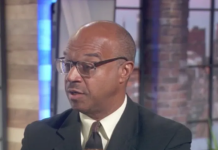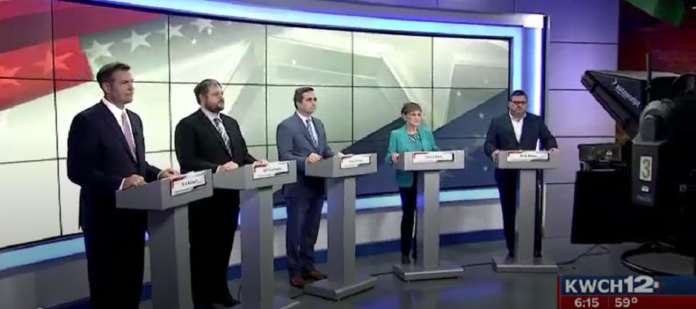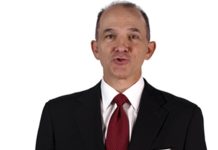(Updated to reflect debate on Medicaid expansion and taxes)
The three major candidates for Kansas governor on Tuesday night split on whether they would restore an executive order providing civil protections for LGBT state employees.
Democrat Laura Kelly and independent Greg Orman said they would sign an executive order protecting lesbian, gay, bisexual and transgender employees from discrimination. Republican Kris Kobach said he would not.
The three major candidates — along with Libertarian Jeff Caldwell and independent Rick Kloos — fielded the question Tuesday night as part of a debate broadcast on KWCH TV in Wichita.
Kelly, a state senator from Topeka, said she would sign an executive order reinstating civil protections for LGBT state employees “as soon as I possibly can.” She also said she would work to get that written into law.
And in a new twist, Kelly said as governor she would work to repeal the adoption bill passed by the Legislature that allows faith-based agencies to deny placements based on religious principles. Critics say it discriminates against LGBT couples.
“We need to be an open and welcoming state,” Kelly said. “Businesses will not come here if they see us as closed and rejecting many of their potential employees.”
Supporters say the bill does not discriminate. They say it’s goal is to protect an organization’s religious faith. They say there other options for adopting children available in Kansas.
The executive order question surfaced at several Democratic primary debates but never emerged for Kobach at any of the primary debates held by the Republican Party.
It’s an issue because three years ago, former Gov. Sam Brownback withdrew an executive order barring discrimination of state employees based on gender identity or sexual orientation.
The anti-discrimination policy had been in place since 2007, when it was signed by former Gov. Kathleen Sebelius.
Kobach didn’t say any more than he would not sign an executive order. “I will not reinstate the order,” he said.
The secretary of state spent the rest of his time on the question rebutting Kelly about how much undocumented immigrants cost the state in public welfare benefits.
Kobach said the undocumented immigrants cost the state hundreds of millions of dollars. Kelly said those immigrants are already ineligible for benefits and don’t cost the state anything.
Orman, meanwhile, was unequivocal on the question of the executive order.
“I would absolutely reinstate the executive order,” Orman said. “Furthermore, I wouldn’t sign any legislation that discriminates against anybody on any basis.”
Orman said he has family members who are gay.
“I wouldn’t want to tell them they can’t build a full and complete life in Kansas or that they in any way should be subject to discrimination,” Orman said.
On other issues:
Taxes: Kobach promises to cut taxes. Called the reversal of the Brownback tax cuts “a disaster.” He promised to return to the taxpayers an estimated $137 million revenue windfall that the state expects to collect from changes in the federal tax code. He also vowed to cap property tax appraisals. He said the state must address high sales taxes.He criticized Kelly for voting for tax increases.
Kelly, meanwhile, said she was proud to help lead the effort to overturn the “Brownback tax experiment.” She added, “It was the best thing and the most necessary thing to do for the state of Kansas.” Reversing the tax cuts, she said, has put the state in a position where it can now adequately fund key taxpayer services.
Orman said he would love to cut taxes immediately but there are taxpayer services that need money. “We’re going to need to fix a lot of things before we can do that.” As a businessman who has run large organizations, Orman said he has the experience to milk the most efficiency out of state government.
Medicaid expansion: Kelly re-emphasized her support for expanding Medicaid. She promised to expand Medicaid in her first year as governor.
Kobach opposed Medicaid expansion. He said he doesn’t think the state can afford it. He again raised the idea of introducing direct primary care to the Medicaid program, where patients pay a subscription for unlimited access to a primary care doctor.
The pros are you get more time with your physician without the hassle of insurance bureaucracy. The disadvantage is you still need insurance for major health problems. An easy-to-understand primer from AARP here.
Orman supported expanding Medicaid, but he thinks there is a way to do it without costing the state a lot of money. He referred viewers to a detailed plan on his website.















